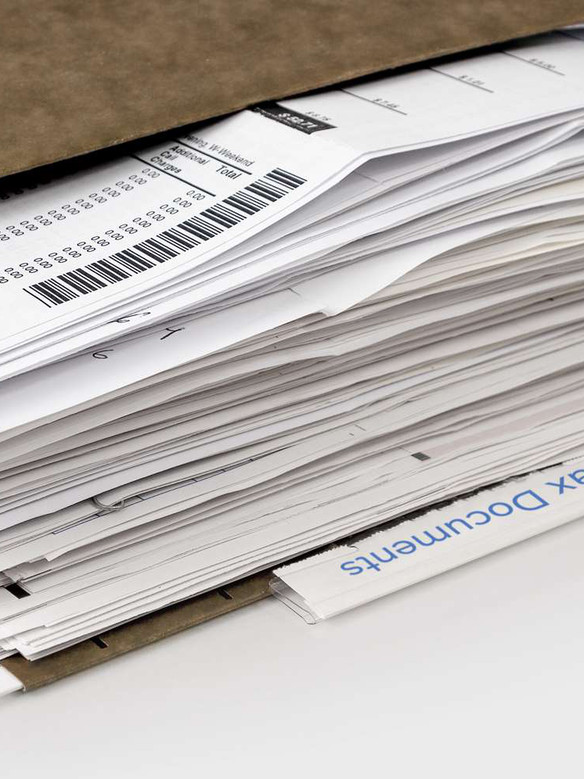Table of contents
While you may have prepared your own tax returns in the past, filing a business tax return is a whole other animal. And now that you’re a busy business owner, you likely don’t have time to learn all the complexities of business taxes. It might be time to hire an accountant. So what forms does your accountant need from you to prepare your return? Let’s take a look at a few.
Starting a new business means new experiences. Fun stuff: You find yourself meeting new people, exploring the wide world of marketing, and maybe even traveling a bit. Not-so-fun stuff: preparing a business tax return. While you may have prepared your own tax returns in the past, filing a business tax return is a whole other animal. And now that you’re a busy business owner, you likely don’t have time to learn all the complexities of business taxes. It just might be time to hire an accountant.
So what forms does your accountant need from you to prepare your return? Let’s take a look at a few. (Remember, this post is for educational purposes. Consult a small-business accountant for tax advice related to your business.)
Prior year’s tax return
The first thing to have ready is your prior year’s tax return. If you’re an LLC or sole proprietor, your accountant will prepare a schedule C for your business, which is part of the 1040 return package you’ll file for yourself. Therefore, your accountant needs to see the information on last year’s 1040 to complete this year’s return.
Federal and state forms
If you provide services, you probably received a few 1099-MISCs (read our explainer on this form) from people for whom you did work. Bring those along, as well as a list of the people you charged for your services. Not everyone sends out a 1099-MISC, and you still need to report that income whether or not they sent you a form.
Likewise, you probably sent 1099-MISC forms to independent contractors who did work for you. Bring copies of those along, as well as the form 1096 you sent along to the IRS reporting to whom you sent 1099-MISCs.
Do you have employees? If so, bring along copies of any W-2s, W-3s, and quarterly payroll reports you filed, in addition to a payroll summary for the year.
You may have quarterly reports that the federal government or your state requires you to send in to report financial transactions. Bring those with you when you see your accountant.
Bank and credit card statements
Since you have a bank account for your business, you should get monthly statements. These provide a lot of information about your business. Your accountant will find the year-end and January bank statement and reconciliation very helpful in putting together your return. In addition, if you have petty cash, bring in your year-end petty cash report and reconciliation.
You might also have a credit card for your business. Take your credit card statements, which should have the interest charges for the year on them, so your accountant can see what you spent that may be deductible.
As the owner of a sole proprietorship or LLC, you probably pay yourself by making withdrawals from the business. Your accountant will want to know about these withdrawals made to you personally, plus any information on any investments made by you. In addition, bring records showing how much you paid for health insurance.
Inventory
Does your business sell products? Be sure to take along an inventory listing, including a listing of inventory purchased during the year. This will help your accountant prepare the cost of goods schedule on your return.
Personal vehicle and home office
Do you use your car or truck in your business? Be sure to take along information about the mileage driven on that vehicle, both for business and personal use, as well as when you started using your car for your business. And don’t forget the vehicle make, model, and year.
If you have a home office, be sure to take along information related to it. This includes the square footage of your home and the office. In addition, give your accountant the amounts you paid for your mortgage or rent, insurance and utilities, and any repairs you made to your home office.
Financial statements
Lastly, you may be using financial software to keep track of your business’s finances. Print out your basic financial statements (the balance sheet and income statement) from the program, as well as a trial balance as of the year-end.
Another thing to keep in mind is that accountants may have a checklist of what they need. When you call to make your appointment, be sure to ask for this checklist. However, you’ll discover that the items listed here will probably cover just about everything on their checklist. So you should be ahead of the game for tax time this year.
Do you have any questions about tax forms? Start the conversation on Twitter.
About TaxJar
Sales tax is complex. That’s why we created TaxJar — to handle the burden of sales tax while you get back to running your business. TaxJar pulls in sales tax collected from all the channels where you sell, compiles your data into return-ready reports, and can even AutoFile your sales tax returns for you in 26 states (and counting). Sign up for a 30-day TaxJar free trial today and put a lid on sales tax. And check out Square App Marketplace for more information on how to link your Square account to TaxJar’s tools.
![]()











